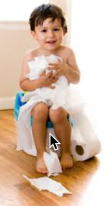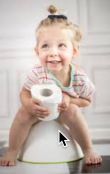Children transition out of nappies and towards a potty or toilet at different times, in different ways and at difference paces according to their age, stage of development and family or parent preferences. Most girls will transition around 2 years old and boys around two years and three months, but this is not a guide, and could be different for different children. It takes time for children to develop control over their bowels and bladder. Adults can support children by being consistent, supportive and encouraging. This policy sets out how Rainbow staff help and encourage this transition, and how to work with parents to ensure that that every child’s transition from nappies be a successful one.
What we do at gan?
As children start to show signs of interest in using the potty or the toilet (we have small child sized toilets) – we sit them on the potty or toilet in between each nappy change to start getting used to the feel of it. This should happen consistently from Zebras onwards. There are other children around, so those new to the potty or toilet learn from their more experienced peers. When children succeed to urinate, or pass a bowel movement in the potty or toilet, we encourage and praise them.
Once children are out of nappies, for the first 3 – 4 weeks staff should check every 15 – 30 minutes if the child needs the toilet. An alarm could be set, and a key worker for toileting allocated.
Children can wear only underwear during the first weeks without a nappy, so that if they need to quickly access the toilet, they can do so without the need to remove lots of clothing and reduce the possibility of getting ‘stuck’
Children should have lots of spare underwear in the first weeks after the nappy is removed. Between 10 and 20 spare pairs of underwear.
Daily feedback should be given to the parents during toileting transitions. Staff should share successes and challenges with the parents
What parents can do at home?
Staff often don’t know what to tell parents, so here is some advice that you can offer:
Have lots of opportunities for ‘nappy free’ time, where your child can run around, and experience having no nappy. They need to feel and experience the sensation of urinating  and passing a bowel movements without a nappy before they will start to develop bladder or bowel control. Don’t expect children to actually use the potty in the beginning, this will take some time. Provide lots of opportunities for children to get used to sitting on the potty, especially when they don’t need to use the toilet, as this will remove any ‘pressure’, and just give them the opportunity to get used to the feeling of sitting on this funny little pot!
and passing a bowel movements without a nappy before they will start to develop bladder or bowel control. Don’t expect children to actually use the potty in the beginning, this will take some time. Provide lots of opportunities for children to get used to sitting on the potty, especially when they don’t need to use the toilet, as this will remove any ‘pressure’, and just give them the opportunity to get used to the feeling of sitting on this funny little pot!
Communication between home and gan
Its very important that parents communicate what they are doing at home so that we can mirror similar experiences at gan, and we can align our expectations at home and gan, so we are all on the same page! Staff should proactively ask parents about transitioning to the toilet as children are approaching two years old and until they are trained. We ask the parents not to surprise us. Transitioning from nappies to using the toilet or potty is something we should know about  well in advance at gan, and we should be working together with parents. Please open the discussion early and regularly so that the parents don’t just come in one day and announce that their child is out of nappies now. This rarely works, and results in lots of toileting accidents at gan.
well in advance at gan, and we should be working together with parents. Please open the discussion early and regularly so that the parents don’t just come in one day and announce that their child is out of nappies now. This rarely works, and results in lots of toileting accidents at gan.
Use of language
Language you use with the children should be respectful, encouraging and patient. Here is some helpful language and phrases staff can use with children who are transitioning.
- You can use the potty when you feel like you need to pee.
- Lets put some dry pants on you….
- Lets just try to see if anything comes out
- You can sit down to pee if you wan to
What will happen at first…
When children are in the transitional period, which for some children can be a few weeks, and for others a few months, we leave the children without trousers, just underwear. This  is so that they can quickly remove clothing in order to use the toilet. It also means that we can much more quickly identify accidents.
is so that they can quickly remove clothing in order to use the toilet. It also means that we can much more quickly identify accidents.
Parents should bring up to 10 spare knickers or pants per day, and extra spare outer clothing. We will feedback to parents each day regarding how their child’s toileting experiences were with us, and tell them about any accidents. During COVID where there is limited face to face contact, this should be sent on a voice note each day via WhatsApp from the gan phone.
It is likely that children will have more toileting accidents whilst they are at gan, in comparison to when they are at home. This is mainly because there is a lot of stimulation and exciting things going on in the gan, and children often see going to the toilet as an inconvenience when they fist start having to do it!
Managing toileting accidents at gan
Always ensure that you are patient with children, and do not show dissatisfaction or frustration when children have missed the toilet and soiled their clothes. Be respectful to children and their dignatity at all times. Help children to change as soon as you notice a toileting accident, don’t wait! Whilst changing the children, you can remind them the importance of using the toilet. Help children to change their clothes, and to feel clean and dry. Try to avoid putting children in clothes that are not their own, especially if they do not want to wear the clothes.
If areas in the classroom or garden have been soiled with either urine or faeces they must be properly and deeply cleaned. Refer to the Prevention of blood borne infection policy and cleaning protocols to ensure appropriate cleaning takes place.
Finally…
Remember to discuss and reinforce hygiene children who are transitioning. Model hand washing, remind children that we flush the toilet after we use it, talk children through how you wipe and clean them up, so they can start to develop these skills too.
